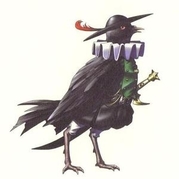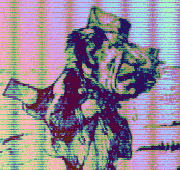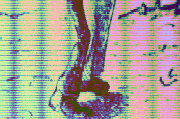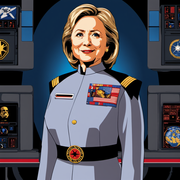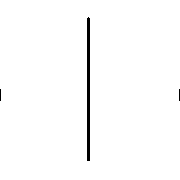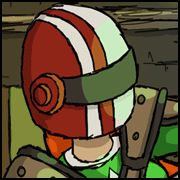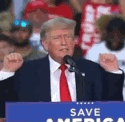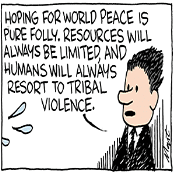|
I realized recently just how tricky this question is to answer. I thought of the question when I read a simple, intuitive argument that dogs don't have free will. The argument went like this: the idea of a dog not chasing a ball you throw, or in any other way disobeying an instinct, just because it's "choosing" to is utterly alien and bizarre. I realized that the same argument also applies to newborn infants: you would never, ever hear an obstetrician say that the reason a newborn baby isn't crying is "just because that's the baby's choice. Ever heard of a little thing called free will?  " "So that of course raises the question: when, exactly, does a child first get free will, and why?
|
|
|
|

|
| # ? Apr 16, 2024 04:55 |
|
Izzhov posted:the idea of a dog not chasing a ball you throw, or in any other way disobeying an instinct, just because it's "choosing" to is utterly alien and bizarre. As for the baby probably not, I guess it doesn't really have the capacity to weigh both options (crying vs not crying) until its senses have developed to the point where it can create a mental model of the world that includes the baby itself.
|
|
|
|
Your examples are not particularly great because you are conflating instinct, in the case of the dog, with reflex in the case of the baby. While "somewhat" related, the two notions operate at vastly different scales. Reflexes, in particular are very well understood. But to answer your actual question: I personally find the arguments in favor of consciousness being a post-hoc mechanism fairly convincing, so I'm going to go with "Never". Aramis fucked around with this message at 16:20 on Oct 23, 2020 |
|
|
|
Mata posted:I don't really follow, surely the dog makes a choice to either chase the ball or not? quote:As for the baby probably not, I guess it doesn't really have the capacity to weigh both options (crying vs not crying) until its senses have developed to the point where it can create a mental model of the world that includes the baby itself.
|
|
|
|
They're born with it. Free will isn't a thing you develop at a certain point in your life, it either exists or it doesn't.
|
|
|
|
never, we just develop an increasing capacity to use our rationality to provide internal emotional justifications for the actions we've already decided to take that is, questions of "free will" to me always boil down to: if I could rewind the entire state of the universe, and everything in it, to the exact state it was in when I made Some Decision, is there any nonzero chance I would make a Different Decision? I believe the answer is no, because I don't believe the decisions I make have an element of cosmic-pinball-randomness to them in the moment they are made, it's all about the leadup that set up that particular state of the universe and my body in it which determines the next form things will take. This isn't to say I "don't believe in free will". I believe I "make decisions of my own agency", it's just that put in the same situation (at a submolecular, whole-universe-state level) I'd always make the same decisions, so the question of what free will is or is not, is not that interesting to me. The Zelazny novella Home is the Hangman has any interesting aside about the difficulties of creating a molecular simulation of an entire universe in an effort to discern the future, IIRC. I think the obvious problem is that any machine which could accurately model any entire universe inherently requires slightly more energy than actually exists in that universe. Godel, Escher, Bach covers a lot of this, too. I was much more warm to that book's view of consciousness than anything loving Sam Harris has to say. Cabbages and Kings fucked around with this message at 16:27 on Oct 23, 2020 |
|
|
|
Aramis posted:Your examples are not particularly great because you are conflating instinct, in the case of the dog, with reflex in the case of the baby. Vincent Van Goatse posted:They're born with it. Free will isn't a thing you develop at a certain point in your life, it either exists or it doesn't.
|
|
|
|
At conception, op.
|
|
|
|
Izzhov posted:I'm no biologist, so I would love some elaboration on what exactly the difference is between them. For me, intuitively, the dog chasing the ball does feel like it could be called a "reflex," so clearly I'm missing some nuance here. Reflexes are low-level neurological processes that partially or completely bypass the cortex, and typically involve only senses that have nerve endings across the whole body (touch, pain, heat, etc...). You can literally remove most of the brain of a creature and they still function. Instinct is an evolution-driven pre-configurations of the cortex, leading to cognitive behaviors that are inherent to the species, like bird-nesting or hunting behaviors. Removing or damaging the brain "breaks" them. Aramis fucked around with this message at 17:10 on Oct 23, 2020 |
|
|
|
mobby_6kl posted:At conception, op. Ted Cruz re-reg found
|
|
|
|
Izzhov posted:How do you answer the example of the newborn baby given in the OP? They still have free will, they just can't make use of it. Do employees and prisoners and soldiers and so on not have free will because they have other people telling them what to do?
|
|
|
|
Aramis posted:Reflexes are low-level neurological processes that partially or completely bypass the cortex, and typically involve only senses that have nerve endings across the whole body (touch, pain, heat, etc...). You can literally remove most of the brain of a creature and they still function. Got it, that makes sense. This seems to suggest a hierarchy of modes of thought, with reflexes at the bottom ("most low level"), instinct a level above reflex, and higher-level brain functions further up. If "free will" is only located in levels of the hierarchy above reflex and instinct, then perhaps humans first get free will once their brain develops those functions.
|
|
|
|
EDIT: whoops I hit quote instead of editVincent Van Goatse posted:They still have free will, they just can't make use of it. Do employees and prisoners and soldiers and so on not have free will because they have other people telling them what to do?
|
|
|
|
Free will has no conceptual coherence outside of a culture and society, a human baby removed from society and culture would never develop anything resembling free will.
|
|
|
|
Cabbages and Kings posted:Godel, Escher, Bach covers a lot of this, too. I was much more warm to that book's view of consciousness than anything loving Sam Harris has to say. Godel, Escher, Bach is an interesting read, but I'm going to throw in a recommendation for Figments of reality: The Evolution of the Curious Mind by Cohen and Stewart as a good layman-friendly introduction to the subject. It doesn't really delve into what consciousness is, but instead mostly explores why consciousness is. It's a much simpler question, but is an important foundation to sit on when tackling the subject. Aramis fucked around with this message at 16:52 on Oct 23, 2020 |
|
|
|
Aramis posted:Godel, Escher, Bach is an interesting read, but I'm going to throw in a recommendation for figments of reality: The Evolution of the Curious Mind by Cohen and Stewart as a good layman-friendly introduction to the subject. haha, yeah, G.E.B. is a good intro for people who either already have or strongly desire a grounding in CS fundamentals. I will check out your rec, have not read. I have long fantasized that my dream job is running a curriculum that would use G.E.B. as a source for CS101 and CS102, and also have a optional enrichment side-path that would explore some of the same concepts through contemplative work (reflecting on Joshu's dog as a koan, etc).
|
|
|
|
Never, OP. Free will is an illusion that we have to pretend we have in order to function without falling apart
|
|
|
|
Izzhov posted:My intuition tells me that whether a dog chases a ball or not is entirely determined by instinct -- that is to say, whether the "chase ball" subroutine in its evolutionary programming is activated by the throwing stimulus. Like if it didn't chase the ball, that would mean there was some extenuating circumstance suppressing that subroutine, such as that it just ate I guess? I'm no zoologist. I can certainly buy into the idea that neither humans or dogs have free will, and depending on where you look for it this seems like the obvious conclusion. but the idea that humans have it and dogs don't raises my hackles. This idea is usually trotted out to justify mistreatment of our fellow conscious beings. Like when dogs do it it's "extenuating circumstance suppressing a subroutine", but when humans do it it's making a choice. These both appear to mean the same thing but the former is expressed in terms that make it sound like some computer algorithm whose components are fully understood. Mata fucked around with this message at 17:32 on Oct 23, 2020 |
|
|
|
Izzhov posted:Employees and prisoners can still choose to go against their orders, unlike newborns. Newborns cannot go along their orders, because they don't understand them to begin with. As for free will, I'd liken it to informed consent. Are you aware of what you are doing, why you are doing it, and what consequences can result? Are you choosing to do it anyway? Can you choose to not do it instead? If you answer yes to all these questions, then you are doing something out of your free will.
|
|
|
|
Free will is protestant religious propaganda. The idea that you must choose actions is a core aspect of Christian theology.
|
|
|
|
Mata posted:I can certainly buy into the idea that neither humans or dogs have free will, and depending on where you look for it this seems like the obvious conclusion. but the idea that humans have it and dogs don't raises my hackles. This idea is usually trotted out to justify mistreatment of our fellow conscious beings. Cat Mattress posted:Newborns cannot go along their orders, because they don't understand them to begin with. Cat Mattress posted:As for free will, I'd liken it to informed consent. Are you aware of what you are doing, why you are doing it, and what consequences can result? Are you choosing to do it anyway? Can you choose to not do it instead? If you answer yes to all these questions, then you are doing something out of your free will.
|
|
|
|
I hesitate to bring up out-of-date and debunked "science" into the mix, but I think it's interesting, so what the heck. If you start from the predicate that there indeed is a post-natal transition from a purely reflex-driven being into someone who cognitively picks one of multiple alternatives, then it's worth noting that Freud has a strong opinion on the matter in his Psychosexual stages of development. It is pretty much one of the defining feature of the transition form the Oral to the Anal stage, which he places around the 1 year mark. Again, don't read too much into it. It's Freud. Aramis fucked around with this message at 21:34 on Oct 23, 2020 |
|
|
|
Izzhov posted:I quite like this rubric. But to challenge it: it makes me think of the example of people who are addicted to substances. When someone is addicted, depending on what the substance is, the question of, "Can you choose to not do it instead?" becomes fraught. The severity of the addiction determines how difficult it is for an addict to choose not to continue using. How difficult must making a choice become before it ceases to be a choice? If you want to do something but can't bring it to happen, doesn't that speak more to the difficulty of the action than to whether or not you chose to try to enact it? If you encase a person in a steel coffin where they can't move, can you really say they don't have free will just because they can't choose to escape? Really, they can "choose" to, but the means of making that choice a reality may be beyond them. For what it's worth, I think that people have the tendency to behave on auto-pilot, but have the capacity to consciously take control of their decision-making processes. This is one of the purposes of mindfulness meditation and various Buddhist practices. I think such capacities can be compromised (through injury/illness/addiction/etc) but that they do exist.
|
|
|
|
Vincent Van Goatse posted:They're born with it. Free will isn't a thing you develop at a certain point in your life, it either exists or it doesn't. Itís this. Except itís the Ďit doesnít existí part. Free will is an illusion. Your mind makes your choices, your Ego just rationalizes them later
|
|
|
|
Vincent Van Goatse posted:They're born with it. Free will isn't a thing you develop at a certain point in your life, it either exists or it doesn't. surely, if one has it, it increases in capacity and power over the developmental lifecycle. like if an infant has free will, then an adult also has free will but can exercise it to a greater extent
|
|
|
|
Finicums Wake posted:surely, if one has it, it increases in capacity and power over the developmental lifecycle. like if an infant has free will, then an adult also has free will but can exercise it to a greater extent How do you figure? If free will is the ability to exercise choice then an infant would have just as much free will as an adult. The ability to understand the consequences of choice or differentiation between choices is irrelevant to the fundamental question of whether the action is a deliberate choice A Typical Goon fucked around with this message at 22:27 on Oct 23, 2020 |
|
|
|
Free will absolutely 100% does not exist, but assuming more usefully we mean the ability to become consciously aware of the act of making a decision, well, it also extremely varies person to person. I think the born with it thing is nonsense. I have a memory of my youth of realizing my own existence and I'd say that moment defines when I believe I became 'conscious' in a tangible way and thus became aware of decision making and the 'freedom' to make those decisions.
|
|
|
|
Having seen the way some grown rear end people make decisions, a lot of people might die before they gain the ability to make thoughtful choices.
|
|
|
|
As mentioned, our agency is limited, and a lot of it only matters in the context of other people. I recommend Ted Chiang's Exhalations for some good short stories musing on the subject.
|
|
|
|
Izzhov posted:My intuition tells me that whether a dog chases a ball or not is entirely determined by instinct -- that is to say, whether the "chase ball" subroutine in its evolutionary programming is activated by the throwing stimulus. Like if it didn't chase the ball, that would mean there was some extenuating circumstance suppressing that subroutine, such as that it just ate I guess? I'm no zoologist. Have you ever actually spent time around a dog? If I throw something and we aren't playing my dog just looks at me like I'm some kind of jackass. If we're walking down the street and my neighbor throws a ball the dog doesn't give a poo poo, or flinches depending. There is no "throwing instinct" that compels them to mindlessly follow any object in motion, there's a general pursuit drive that can make fetch an enjoyable game for dogs to play with their friends in the same way that tag can be a fun game for humans. Your whole line of questioning presupposes that what separates humans from other animals is that other animals all work exactly like the wildlife in a videogame or some poo poo. A Wizard of Goatse fucked around with this message at 08:37 on Oct 24, 2020 |
|
|
|
I believe babies are like dogs and they just sort of do things arbitrarily.
|
|
|
|
in most states you have to be 18 to have a legally recognized will, but I'm pretty sure it's always free you just need two witnesses that aren't beneficiaries of the estate to sign off on it with you
|
|
|
|
We don't. Everything is determined by electrochemical impulses in the 10-pound slab of bacon we call a mind. How do you form the intent to form intent?
|
|
|
|
Never, thank god, imagine if your decisions were just based on a cosmic game of dice, that'd be loving terrible.
|
|
|
|
Zeroisanumber posted:We don't. Everything is determined by electrochemical impulses in the 10-pound slab of bacon we call a mind. How do you form the intent to form intent? This is one of my problems with free will. If you have to choose to decide, then before you can make a choice you have to decide to make that choice. But to decide to decide to make a choice is also a choice. This just leads you to an infinite feedback loop where nothing would ever get chosen because first you have to choose to decide on a choice. Obviously this isnít how human cognition works, we just automatically pick an option
|
|
|
|
Edit: no
|
|
|
|
What even "is" free will? I am completely unqualified to answer this. One framework says that to have free will you need the freedom to do otherwise and self-determination. Which is great, until you realize now you need to determine what it means to self-determine. Self-determination theory suggests you need autonomy, (you can be causal) competence, (control the outcome and experience mastery) and Relatedness (Will *internal screaming intensifies* to interact with, be connected to, and experience caring for others.) At this point I give up and say that if you can pass the Mirror Test you are sentient, and therefore have free will. Humans start passing at around 18 months, so I say at 18 months humans have free will.
|
|
|
|
Izzhov posted:Employees and prisoners can still choose to go against their orders, unlike newborns. I see youíre not that familiar with babies. They are not obedient.
|
|
|
|
Yeah, I think this whole question is coming from a false premise and an incorrect idea of how dogs work. Dog training has actually helped me a lot to understand my own needs and impulses- like how punishment is not a very good tool, and counterconditioning to reinforce a better alternative behavior is a healthier and more effective choice! It's also helpful to realize that dogs are a BROAD category. "Instincts" vary a lot by breed, but breeds are an artificial construct. We create useful working breeds by choosing for optimal brain chemistry, really- you cultivate the dogs who get the happy chemicals and enjoy the task you want them to perform. You want training with the positive reinforcement to be as easy as possible. The dog needs to WANT to do the job they're assigned, or else they won't be very useful. Not every dog in the breed will have the traits you want, but the chances should be good. Hence, plenty of dogs totally WON'T fetch a ball, because it's not something that's fun to them. You can maybe teach them by finding something else rewarding to encourage them to do it anyways, but it is by no means an automatic programmed behavior in all dogs. Learning all this stuff about dogs has helped me accept and work WITH my own brain and things like ADHD, and not against it. The way this question is posed, I think by "free will," here we're more talking "self-awareness" or maybe "mindfulness..." The ability to try to understand what does motivate our behavior and why. dogs are cool edit: oh man actually, I def recommend reading about sled dogs for a good example of a dog that is cultivated explicitly TO have some free will as defined here! A dog that will refuse your orders when it knows better is a dog that won't cross ice you don't realize is too thin, and can save your rear end!! Harvey Birdman fucked around with this message at 19:30 on Oct 24, 2020 |
|
|
|

|
| # ? Apr 16, 2024 04:55 |
|
I apologize for my dog-related errors. I probably should have just included the newborn example since I actually have some experience with those as compared to dogs.evilweasel posted:I see youíre not that familiar with babies. They are not obedient.
|
|
|






